INTRO
In a continuation of my series of reviews from Bloomsbury Academic's Object Lessons is a guest review by Neil Béchervaise of Email by Randy Malamud.Neil's Review
To: Critical_Readers@everywhere.wotCC: other_readers@elsewear.wot.qt
BCC: sum_mmoor@nocansee.wot
Subject: Randy Malamud's email re Email
Hi reader,
150 pages about email definitely provides an object lesson in the value of emergent technologies.
Isn't it great that we now have entire IT departments to manage our computer requirements? That we have a 'safe' password with miscellaneous C@ps,l0wer case letters and randOm num3rals secured @ some mysterious location beyond the grasp of hackers - Russian, Nigerian and teenager-next-door - that we can finally relax at work? That we can trawl through our emails at leisure, reply all - or maybe BCC the few who really need to know - and feel relatively comfortable in recognition of the fact that our actual effectiveness has dropped by about 25% and that is quite all right?
Malamud's contribution to Bloomsbury's series of 70-odd Object Lessons provides some interesting history in the development of communications technology, some salutary lessons in the value of its implementation and a very well researched but never quite explicitly stated argument for why we should probably dismiss the old chestnut that "Computers are your friends, they save you time".
Indubitably, email has become one of the great time-fillers of the 21st century - so far. Yes we wake to check our emails, we take our phone with us to the wash-room (just in case anything important comes through) and we check for those crucial after-hours messages before we turn out the lights at night. Malamud's Email, however, does even more than that. It provides a deeply considered commentary on both the relative value of the email when compared with that personalised yet almost extinct ink-to-paper communication, the letter.
Querying the authenticity of 'the in-box', within which accumulates, without so much as a secretary or a postie ever passing, the 'junk mail' and 'spam' accumulate, Malamud provides a humorous if somewhat cynical (and is that ironic, or not?) several hours of reading which could have been spent clearing and/or replying to another overload of vital mail.
I must say that I enjoyed Randy Malamud's Email. It dragged me away from my keyboard, reminded me of a time long passed when I, too, took time out to write (and cross out and rewrite and add margin notes on paper with a pen or a pencil). More significantly, Email engaged me in a brief reflection on the extent to which we have endangered our social networking skills with technology. Most of all perhaps, it gave me a laugh at the susceptibility of the academic to enticements to publish - so s/he does not perish. Maybe email has a place, after all.




































